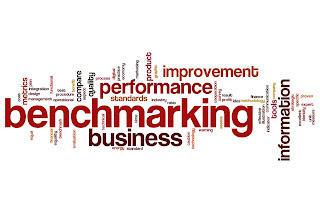The Benchmarking Strategy(chapter1)
1.introduction
-benchmarking is the matural evolution of concepts of competitor and mariket analysis, quality improvement programs, performance measurement.
-the art of learning from companies performing certain task better than other companies.
-searching for best practices and implementation.
2.focus on business process
-the business has problems and benchmarking is used to find innovative solutions to those problems.
-the benchmarking focuses on business process for continuous improvement toward company's goals
-improving key business processes by incorporating best practices.
3.benchmarking tied to mission &objectives
-the congruence of goals from top to bottom and the relationship of company's goal and every employee goal is needed in every company.
-the development of mission statement, goals, objectives, and priorities from TQM perspective
-the required improvement strategies used to achieve organizational aoals tied with benchmarking.
-the process of prioritizing benchmarking activities supporting organizational goals.
4.managing the bechmarking process
-two parts of benchmarking process"management and user process
-user process is the 10steps used to complete the benchmarking investigation.
-management process is about managing activities to ensure the effectiveness of benchmarking.
5.purpose of benchmarking remain the same
-analyze the operation : assess the strengths and weaknesses of current work processes
-know the competition and industry leaders
-incorporate the best of the best i.e, learn from the best leaders and emulate the best practices.
-gain superiority i.e. become new benchmark.
6.scope of benchmarking
benchmarking conducts on the following scope:
-products and services: establish those features and functions desired by customers
-business process: continuous business process improvement and reengineering
-performance measure: measure the benchmarking of products, services, processes.
6.1. types of benchmarking
-internal: comparison among similar operation within one's own organization
-competitive:comparison of methods to companies with similar processes in the same function
-generic process: comparison of work process to others who have innovative exemplar work process
6.2. focus levels
-strategic level: concentrate on strategic factors by conducting environmental scanning to detect trends and threats affecting company
-operational level: used to understand specific customer requirements, best practices satisfying customers, and determine operational performance level.
7.benchmark and benchmarking
7.1. benchmarking: a process or activity
-xerox definition: the continuous process of measuring our products, services and practices against our toughest competitors or those companies known as leaders
-quality definition: a standard process used to evaluate success in meeting customer requirements
-dictionary definition :a standard against which something can be measured.
-generic definition: a basis of establishing rational performance goals through the search for industry best practice that will lead to superior performance.
7.2. benchmark
-an industry stadard
-descriptive benchmarks or practice: any work process is made up of inputs, repeatable set of steps based on a set of practices or methods and outputs. if the practices are the best in the industry they will deliver the out puts that will satisfy
-qualitative benchmarks of performance measurements: benchmark measurements are the conversion of benchmark practices to operational measures.
8.reasons for benchmarking
-to gain competitive advantage
-to best serve customer needs
-to improve organizational performance
-to adapt to continuous changing environment
-to generate more profits
reference:
--rebert c. camp (1995) the biz process benchmarking, finding and implement best practices, ASQC
--tony bendell, louise boulter, &john kelly (1993), benchmarking for competitive advantage , pitman publishing.










No comments: